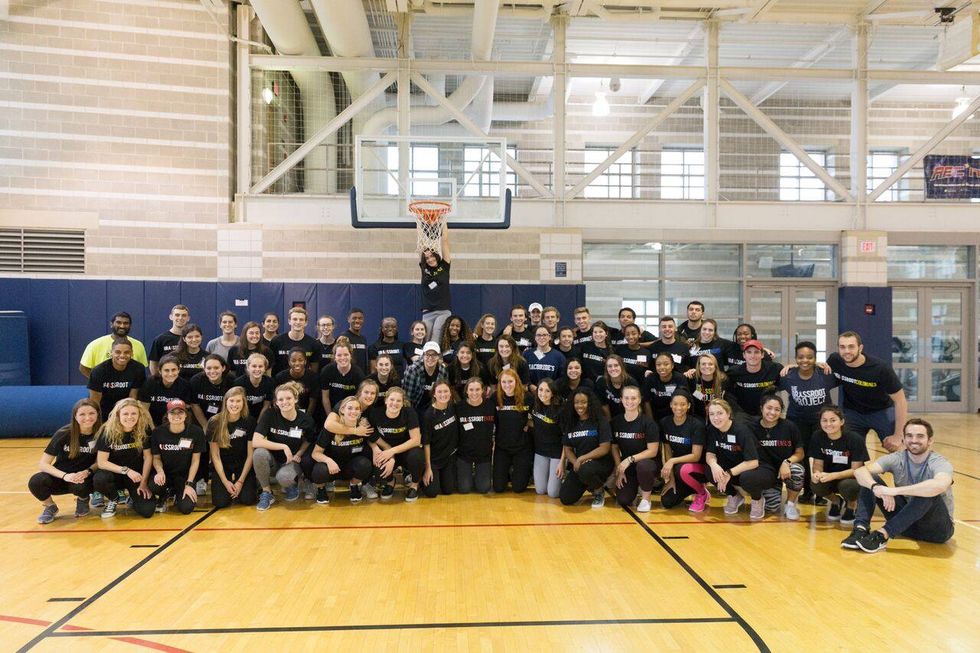It was often mid-afternoon during the school week when I would ask one of my closest friends to meet me for lunch. Her answer was almost always, “sorry I have Grassroots”. I would then find another person to grab food with while she would enhance her day by interacting with middle school children in the DC area. In these moments I felt powerless. I idly watched from the sidelines while my friends took action in our community.
Being a collegiate student-athlete, I had difficulty imagining how I could balance volunteering, class, and my sport, but as January rolled around, the sign up to become a member of The Grassroots Project emerged. As I researched the organization I was shocked at what I had found.
Our capital’s HIV prevalence rate was astonishingly high and close to that of rates in sub-Saharan Africa. Being new to the city, I had always pictured DC as the pinnacle of health care because of the presence of influential government authority figures, but I was blinded by this distortion.
I learned that The Grassroots Project (TGP) has been successful in lowering the HIV rate in DC by having student-athletes teach middle schoolers proper sexual health education that they would otherwise not receive. Upon hearing this, I joined the team and have not looked back since.
Combined with student-athletes from The George Washington University, Georgetown University, American University, and Howard University, we completed 12 hours of training to become a certified TGP coach. Those 12 hours were not just dedicated to learning the curriculum; with the guidance of our brilliant TGP Directors and Program leaders, we enhanced our teambuilding & collaborative skills and learned from our expert master trainers how to handle difficult situations with our young students.
One reason why this program is restricted to collegiate student-athletes is that the characteristics that most athletes possess, such as leadership and initiative, are essential to being a successful coach. What we do is not a simple task. We do not walk in and effortlessly sprinkle information about STI’s and HIV into minds that are hungry for this knowledge.
Oh, how I wish it were that easy!
Instead, we are greeted by a group of rambunctious 6th graders who are filled to the brim with energy after sitting in a classroom all day. When discussing sexual health at this age, there are many challenges while getting the group to focus on the task at hand. It takes trust building and creating mutual respect between coaches and students.
The founder of Grassroots DC foresaw how difficult it would be to get young students to grasp what they were learning, so he ingeniously implemented more fun aspects to the teaching. This includes interactive lesson plans that make us athletes seem like coaches rather than teachers and having funky nicknames that both coaches and students go by. All parts of the program allow for a more comfortableatmosphere for the students to learn in.
As my first program has progressed, there has been a present shift towards curiosity as the students have grown more accustomed to us. Questions become more frequent and you can see their young, developing brains grasping onto the concepts we teach.
I am lucky to be a part of a volunteer group that gives me purpose throughout my day. I have found that while we coaches, teach the students a large sum, in return we get just as much out of it by learning valuable lessons from them as well.
I learned meaning skills that I will take with me long after I graduate college. By being in a position where I can implement change, I have gone through key experiences that contribute to cultivating leadership skills. Each lesson we teach at TGP can have a great impact on each child we work with. If a coach is not all in one day, then it will affect the children’s ability to learn key information that can enhance their future.
We don’t have the opportunity to let a bad mood overpower us. Our goal at the end of the day it to teach our lesson effectively and that cannot be achieved if we allow for any outside factors to affect us while we are teaching. I speak for all of us coaches in saying that we have gained great leadership skills by pushing through moments of weakness for a cause that is more important than ourselves.
I also learned what resiliency looks like. Resiliency is one of the key messages we teach, but in return, the students show us each day what that truly means. The lives of the kids we work with are not easy. The majority of them face more struggles each day than I may ever deal with in my lifetime. I will never understand what they go through, but I will forever be inspired by the wide smiles on their faces despite the battles these youths are burdened with.
The Grassroot Project was created because an ambitious Georgetown athlete Tyler Spencer, nicknamed T-Spence, decided to tackle an issue that was overpowering his community. Additions to the team, including Jdub, Soz, Ruvi Groovy, and many more, have been incredible figures for us younger undergraduate student-athletes to look up to. We are so lucky to have the ability to learn from such empowering role models who instill belief in us that we can help create a change in the world.
They were able to harness the passion of giving back in each of us athletes to create a dynamic TGP family. Thanks to them, all of the other TGP athletes, and alumni athletes, we have been able to change ourselves and our community for the better.

















